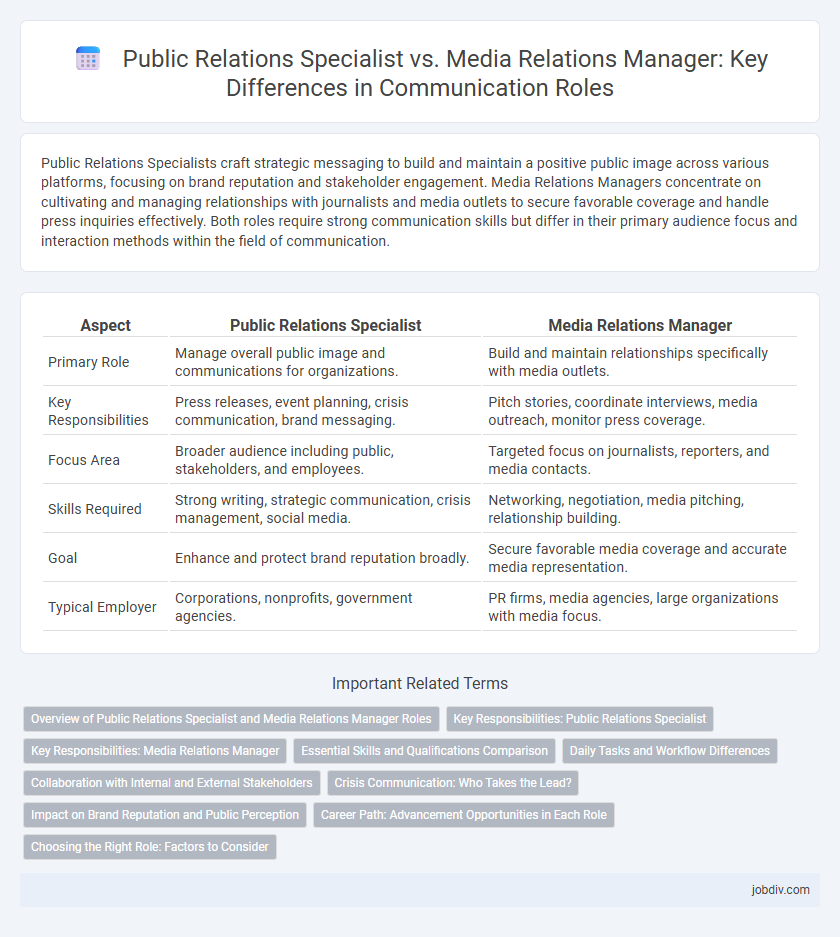Public Relations Specialists craft strategic messaging to build and maintain a positive public image across various platforms, focusing on brand reputation and stakeholder engagement. Media Relations Managers concentrate on cultivating and managing relationships with journalists and media outlets to secure favorable coverage and handle press inquiries effectively. Both roles require strong communication skills but differ in their primary audience focus and interaction methods within the field of communication.
Table of Comparison
| Aspect | Public Relations Specialist | Media Relations Manager |
|---|---|---|
| Primary Role | Manage overall public image and communications for organizations. | Build and maintain relationships specifically with media outlets. |
| Key Responsibilities | Press releases, event planning, crisis communication, brand messaging. | Pitch stories, coordinate interviews, media outreach, monitor press coverage. |
| Focus Area | Broader audience including public, stakeholders, and employees. | Targeted focus on journalists, reporters, and media contacts. |
| Skills Required | Strong writing, strategic communication, crisis management, social media. | Networking, negotiation, media pitching, relationship building. |
| Goal | Enhance and protect brand reputation broadly. | Secure favorable media coverage and accurate media representation. |
| Typical Employer | Corporations, nonprofits, government agencies. | PR firms, media agencies, large organizations with media focus. |
Overview of Public Relations Specialist and Media Relations Manager Roles
Public Relations Specialists develop and maintain a positive public image for their clients by crafting press releases, organizing events, and managing promotional materials. Media Relations Managers focus on building and sustaining strong relationships with journalists and media outlets to secure favorable coverage and handle crisis communication effectively. Both roles require strategic communication skills but differ in their primary focus on audience engagement versus media network management.
Key Responsibilities: Public Relations Specialist
Public Relations Specialists craft and distribute press releases, manage media inquiries, and coordinate events to shape positive public perceptions of their organization. They develop targeted communication strategies to promote brand awareness and handle crisis communication effectively. Their role demands strong writing skills, media monitoring, and relationship-building with journalists and influencers.
Key Responsibilities: Media Relations Manager
Media Relations Managers oversee strategic communication between an organization and the media, crafting press releases, coordinating interviews, and managing crisis communication to maintain a positive public image. They build and sustain strong relationships with journalists, editors, and media outlets to secure favorable coverage and timely dissemination of company news. Their key responsibilities also include monitoring media trends, analyzing coverage impact, and advising senior leadership on media strategies to enhance brand reputation.
Essential Skills and Qualifications Comparison
Public Relations Specialists excel in strategic communication, content creation, and audience engagement, requiring strong writing skills, creativity, and knowledge of digital media tools. Media Relations Managers prioritize building and maintaining journalist relationships, crisis communication expertise, and extensive experience in media outreach and negotiation. Both roles demand exceptional interpersonal skills, adaptability, and a deep understanding of brand messaging to effectively manage public perception and media interactions.
Daily Tasks and Workflow Differences
Public Relations Specialists primarily focus on crafting press releases, managing brand reputation, and coordinating events to engage the public effectively. Media Relations Managers concentrate on building and maintaining relationships with journalists, pitching stories, and monitoring media coverage to ensure positive exposure. Workflow differences highlight PR Specialists' emphasis on content creation and campaign strategy, while Media Relations Managers prioritize strategic communication with media outlets and crisis communication management.
Collaboration with Internal and External Stakeholders
Public Relations Specialists collaborate closely with marketing teams, executives, and external media outlets to craft cohesive messaging that aligns with organizational goals. Media Relations Managers focus on building and maintaining strong relationships with journalists, editors, and media influencers to ensure accurate and favorable coverage. Both roles require strategic coordination with internal departments and external partners to enhance brand reputation and manage public perception effectively.
Crisis Communication: Who Takes the Lead?
In crisis communication, a Public Relations Specialist typically takes the lead by crafting key messages and managing stakeholder communication to maintain the organization's reputation. Meanwhile, the Media Relations Manager coordinates with media outlets to ensure accurate and timely information dissemination, controlling the narrative during public scrutiny. Effective crisis management relies on the collaboration between these roles to balance internal communication strategies and external media engagement.
Impact on Brand Reputation and Public Perception
Public Relations Specialists shape brand reputation by crafting strategic messaging and managing crisis communication to maintain positive public perception. Media Relations Managers focus on building strong relationships with journalists, ensuring consistent and favorable media coverage that reinforces brand credibility. Both roles are critical in influencing how audiences perceive a brand, with PR Specialists addressing broader reputation management and Media Relations Managers targeting media engagement.
Career Path: Advancement Opportunities in Each Role
Public Relations Specialists often advance by developing expertise in strategic communication and expanding their network, leading to roles such as PR Manager or Communications Director. Media Relations Managers typically progress by strengthening media contacts and negotiation skills, moving into senior positions like Media Director or Corporate Communications Manager. Both career paths emphasize leadership and strategic influence but differ in their focus on media engagement versus broad public narratives.
Choosing the Right Role: Factors to Consider
Choosing between a Public Relations Specialist and a Media Relations Manager requires evaluating your expertise in crafting strategic communication plans versus managing media interactions and press coverage. A Public Relations Specialist often focuses on broader brand messaging and stakeholder engagement, while a Media Relations Manager emphasizes building relationships with journalists and securing positive media exposure. Consider your strengths in storytelling, media networking, and crisis communication to determine the role that best aligns with your career goals and organizational needs.
Public Relations Specialist vs Media Relations Manager Infographic

 jobdiv.com
jobdiv.com